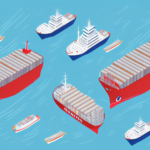Find Carrier Jobs Near You: A Comprehensive Guide
The world of logistics and transportation offers a vast range of career opportunities, with one such vital role being that of a carrier. Carriers are responsible for transporting goods and materials from one location to another, utilizing various modes of transportation such as trucks, planes, and cargo ships. If you're interested in pursuing a carrier job, this comprehensive guide provides everything you need to know to find the right position for you, including researching carrier jobs, searching for opportunities online, understanding qualifications and salary expectations, crafting an effective resume, preparing for interviews, and networking for further career advancement.
The Importance of Researching Carrier Jobs Before Applying
Before embarking on your job search for a carrier position, it's crucial to research the industry and the various types of carriers available. This will help you determine which carrier job aligns best with your interests and qualifications. For example, you may be interested in driving trucks, operating machinery, or preferring roles on cargo ships or airplanes.
Research also helps you understand the qualifications needed, including the type of license required, certifications, and educational prerequisites. Typically, you'll need a relatively clean driving record and good physical condition to work as a carrier.
Another critical aspect to consider is the work schedule. Depending on the carrier job, you may be required to work irregular hours, including weekends and holidays. Understanding the work schedule is essential to ensure it fits your lifestyle and commitments.
Moreover, researching carrier jobs can help you identify potential employers and job opportunities. Utilize online job boards, industry publications, and networking events to connect with carriers and learn about available positions. This targeted approach can increase your chances of finding a carrier job that's a good fit for you.
How to Search for Carrier Jobs Online
The internet has revolutionized job hunting, making it easier and more efficient to find carrier jobs online. Start by searching reputable job sites such as Indeed, Glassdoor, and Monster. These platforms allow you to filter search results based on location, mode of transportation, and experience level.
Additionally, many companies post job opportunities directly on their websites, providing access to positions that might not be listed on other job sites. For instance, major logistics companies like FedEx, UPS, and DHL frequently update their career pages with new openings.
When searching for carrier jobs online, it's essential to read each job listing carefully to understand the specific requirements, such as prior experience or necessary licenses like a Commercial Driver's License (CDL). Ensuring you meet these criteria before applying can save time and increase your chances of success.
Networking is another powerful tool when searching for carrier jobs online. Joining online forums or groups related to the transportation industry can help you connect with professionals who may have information about job openings or can offer advice on improving your chances of being hired.
Attending virtual job fairs or industry events can also provide opportunities to meet recruiters and learn more about different carriers and their hiring processes. By leveraging both online resources and networking opportunities, you can enhance your job search strategy and find the right carrier job for you.
Exploring Different Types of Carrier Jobs
Carrier jobs span a diverse range of roles, each requiring different qualifications and offering varied responsibilities and salary expectations. Common types of carrier jobs include:
- Truck Drivers: Transport goods over long and short distances.
- Airline Pilots: Fly planes to transport passengers and cargo.
- Ship Captains: Navigate cargo ships across oceans and seas.
- Railroad Engineers: Operate trains to move freight and passengers.
When exploring carrier jobs, consider factors such as the level of travel involved and the physical demands of the job. For example, airline pilots and ship captains often travel extensively and spend significant time away from home, while truck drivers and railroad engineers might have more predictable schedules but still face long hours on the road or tracks.
Additionally, the level of physical activity varies among carrier jobs. Some roles may require prolonged periods of sitting, while others involve manual labor and moving heavy objects. Assessing your personal preferences and physical capabilities is crucial in choosing the right carrier job.
Understanding the Qualifications Needed for Carrier Jobs
The qualifications for carrier jobs vary widely depending on the specific role:
- Truck Driving Jobs: Typically require a Commercial Driver's License (CDL) and a clean driving record.
- Airline Pilots: Require extensive flight training, certifications, and hours of flight experience.
- Ship Captains: Need maritime certifications and significant experience at sea.
- Railroad Engineers: Often require technical training and certifications specific to the rail industry.
Many carrier jobs also require a clean driving record and may involve background checks. Physical fitness is another common requirement, as roles may involve lifting heavy objects or enduring long hours on the job. For instance, package delivery drivers must be able to lift and carry packages weighing up to 70 pounds, while airline baggage handlers may need to handle luggage weighing up to 100 pounds.
Understanding these qualifications before applying helps ensure you meet the necessary criteria and are well-prepared for the demands of the job.
Tips on Crafting an Effective Carrier Job Resume
Your resume is often the first impression a potential employer has of you, so it's crucial to make it count. When applying for a carrier job:
- Highlight Relevant Experience: Include any driving, piloting, or navigational experience you have.
- Include Licenses and Certifications: Clearly list any necessary licenses, such as a CDL or pilot's license.
- Use Keywords: Incorporate keywords from the job description to pass applicant tracking systems (ATS).
- Tailor Your Resume: Customize your resume for each job application, emphasizing the skills and qualifications that match the job requirements.
Additionally, ensure your resume is free of errors by proofreading carefully and having someone else review it. A well-crafted resume can significantly increase your chances of advancing to the interview stage.
The Interview Process for Carrier Jobs: What to Expect
The interview process for carrier jobs typically includes questions about your training, experience, and qualifications. You may be asked to provide specific examples of how your skills align with the job requirements.
Expect to discuss various aspects of the role, such as your ability to handle long hours, your experience with the specific mode of transportation, and your problem-solving skills in challenging situations.
Additionally, many carriers will conduct background checks and may require drug tests before extending a job offer. It's important to be prepared for these steps and to present yourself as a reliable and responsible candidate.
During the interview, don't hesitate to ask questions about the company's culture, benefits, and expectations. This demonstrates your interest in the role and helps you assess whether the company is the right fit for you.
Benefits and Perks of Working as a Carrier
Working as a carrier can offer numerous benefits and perks, including:
- Job Security: The demand for skilled carriers remains robust, ensuring stable employment opportunities.
- Competitive Pay: Salaries vary by role and experience, with many carrier jobs offering attractive compensation packages.
- Career Advancement: Opportunities for growth and advancement within companies and the broader transportation industry.
- Healthcare and Retirement Plans: Many employers provide comprehensive benefits, including health insurance and retirement savings plans.
- Training and Development Programs: Access to programs that help you enhance your skills and advance your career.
- Flexible Schedules: Some carrier jobs offer flexible scheduling options, allowing for a better work-life balance.
These benefits can make a career in transportation not only rewarding financially but also fulfilling in terms of personal and professional growth.
Salary Expectations for Different Types of Carrier Jobs
Salary expectations for carrier jobs vary widely based on the specific role and level of experience:
- Entry-Level Positions: Roles such as truck driving or cargo handling typically offer salaries ranging from $30,000 to $40,000 per year.
- Mid-Level Positions: More specialized roles like delivery coordinators or logistics managers may offer salaries between $50,000 and $70,000 annually.
- Specialized Positions: Highly specialized roles such as airline pilots or ship captains can earn between $70,000 to over $100,000 per year, depending on experience and employer.
According to the Bureau of Labor Statistics, the median annual wage for transportation and material moving occupations was $38,000 in 2023, with variations depending on specific job roles and regions. For detailed salary information, refer to the official BLS website.
A Day in the Life of a Carrier: What to Expect on the Job
Working as a carrier can be both physically demanding and rewarding, with day-to-day responsibilities varying by specific role:
- Truck Drivers: Spending long hours on the road, handling cargo, ensuring timely deliveries, and maintaining their vehicles.
- Airline Pilots: Managing flight operations, navigating aircraft, ensuring passenger and cargo safety, and adhering to strict schedules.
- Ship Captains: Overseeing ship operations, navigating through various sea conditions, managing the crew, and ensuring cargo is transported safely.
- Railroad Engineers: Operating trains, monitoring track conditions, coordinating with dispatchers, and ensuring the timely movement of goods and passengers.
Regardless of the specific carrier job, expect to work under tight deadlines, manage challenging conditions like traffic or weather, and maintain high standards of safety and efficiency.
Top Companies Hiring for Carrier Jobs Near You
Several leading companies actively hire for carrier jobs across various locations. Some of the top companies to consider include:
When selecting companies to apply to, consider your qualifications, experience, and personal interests. You can find job openings by visiting these companies' career pages, searching job sites, or through local recruiting offices.
How to Network with Other Carriers and Advance Your Career
Networking is a valuable strategy for advancing your career as a carrier:
- Join Carrier Associations: Becoming a member of professional associations or transportation organizations can connect you with industry professionals.
- Attend Industry Events: Participating in conferences, seminars, and workshops provides opportunities to meet recruiters and other carriers.
- Utilize Online Platforms: Engage in online forums or LinkedIn groups focused on transportation and logistics.
Networking allows you to learn about industry trends, discover job openings, and receive mentorship from experienced professionals, enhancing your career growth and opportunities.
Common Challenges Faced by Carriers and How to Overcome Them
Carriers often encounter several challenges, including:
- Traffic and Delays: Unexpected traffic or logistical delays can impact delivery schedules.
- Weather Conditions: Adverse weather can make transportation routes hazardous and cause delays.
- Long Hours and Extended Periods Away from Home: Many carrier jobs require long shifts and time away from family.
- Physical Strain: Handling heavy cargo can lead to physical fatigue or injury.
To overcome these challenges:
- Plan Ahead: Utilize GPS and traffic monitoring tools to anticipate delays and plan routes accordingly.
- Stay Organized: Keep meticulous records and schedules to manage time effectively.
- Maintain Communication: Regularly communicate with your company and fellow carriers to stay informed about potential challenges.
- Prioritize Health: Implement ergonomic practices to reduce physical strain and take regular breaks to maintain well-being.
The Future of the Carrier Industry: Trends and Predictions
The carrier industry is poised for significant growth and transformation in the coming years, driven by factors such as global economic expansion and technological advancements:
- Automation: The use of drones and autonomous trucks is increasing, enhancing efficiency and reducing labor costs.
- Environmental Sustainability: There is a growing focus on reducing fuel consumption and emissions, leading to investments in eco-friendly technologies.
- Digital Transformation: Adoption of digital tools for tracking, communication, and logistics management is streamlining operations.
- Global Trade Expansion: As global trade continues to grow, the demand for carrier services is expected to rise proportionally.
Staying informed about these trends and adapting to technological changes will be crucial for carriers to remain competitive and successful in the evolving industry.
As demonstrated, working as a carrier offers a wide range of opportunities and benefits. With this comprehensive guide, you should be well-equipped to embark on your job search with confidence and find the right carrier job for you. Good luck!




















